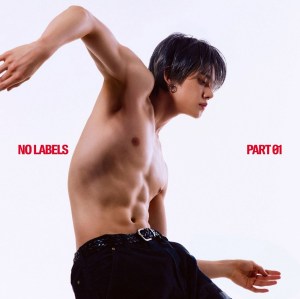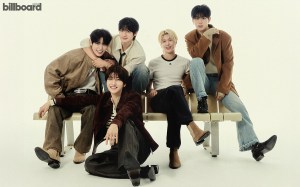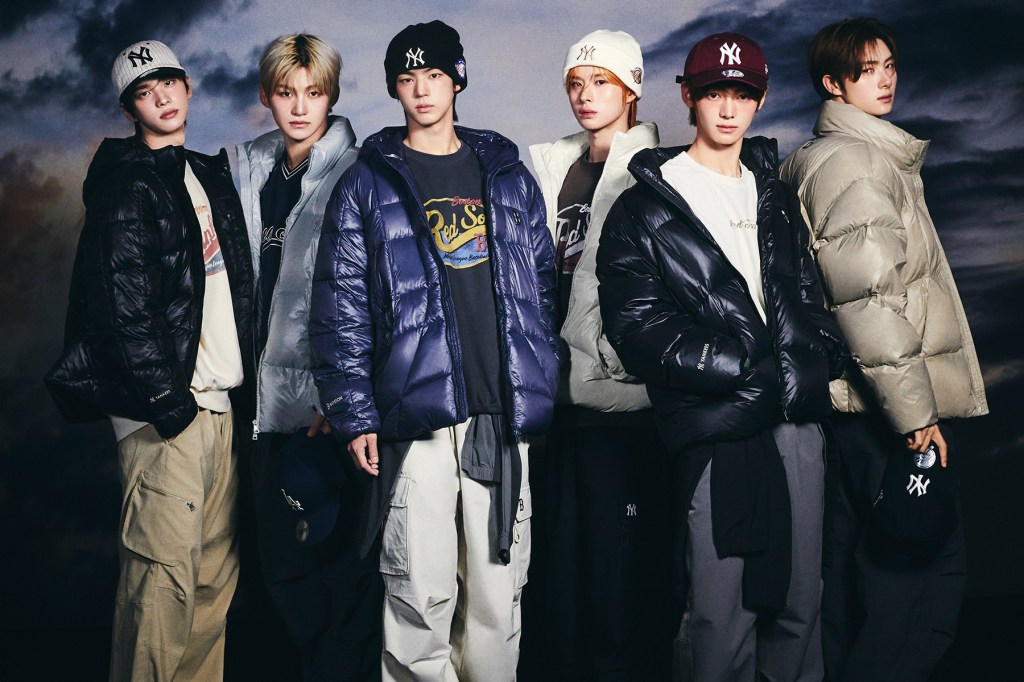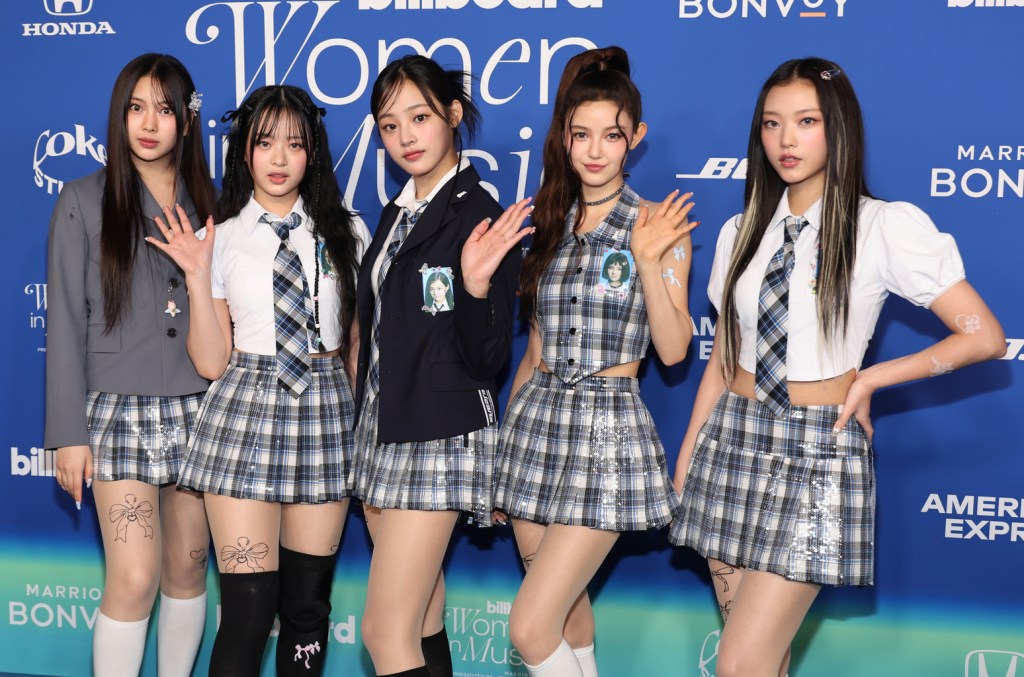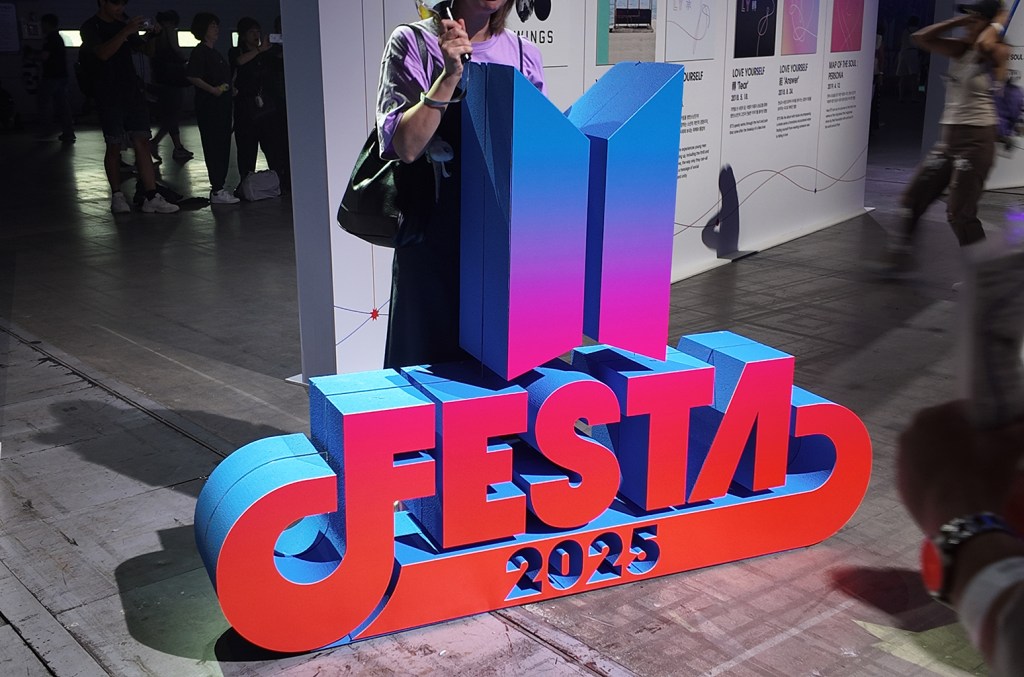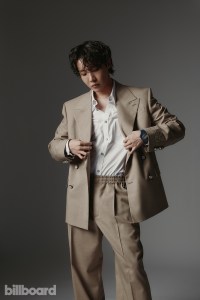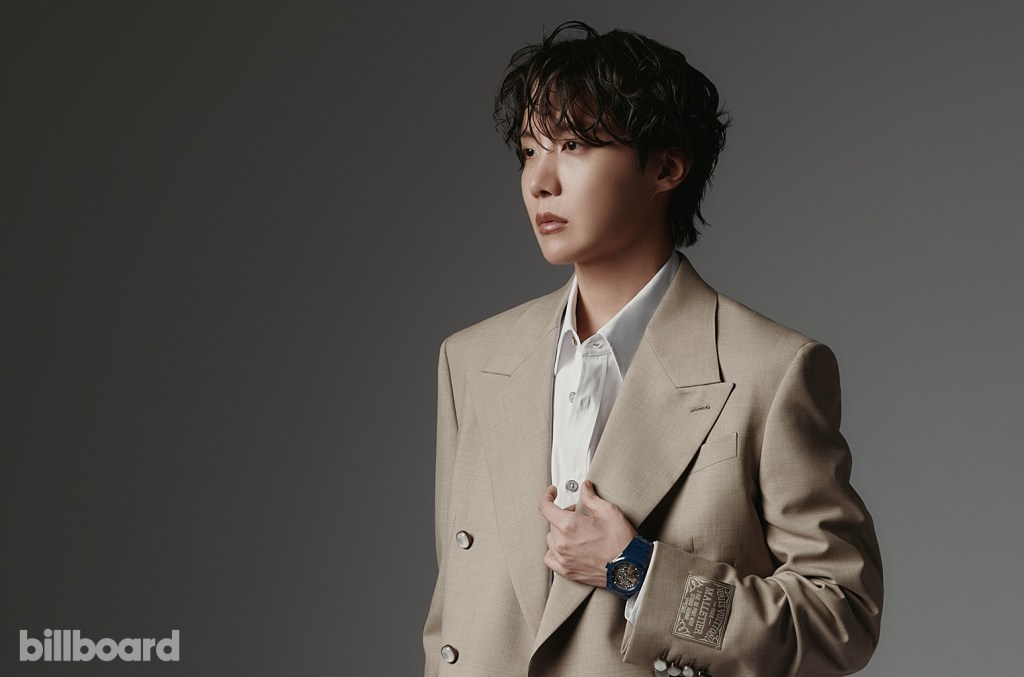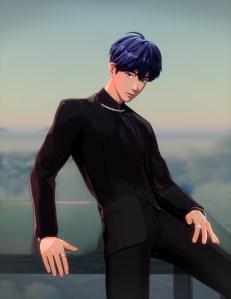Billboard Korea
Trending on Billboard
Released Nov. 7, YEONJUN’s debut solo album NO LABELS: PART 01 is one of the most compelling K-pop releases of 2025.
When his first mixtape GGUM dropped in fall 2024, it initially felt like a slightly puzzling choice. Its electronic-tinged hip-hop sound — filled with mechanical textures, indistinct vocals, and a repetitive hook — seemed to lean more toward concept than toward showcasing YEONJUN’s strengths: vocal ability, dynamic tonal shifts, and live power that had long been overshadowed by his reputation as a dancer. Yet as reactions remained divided, the view began to shift as I watched YEONJUN continue stepping onto stages alone — including year-end award music shows — driven purely by love for performance. I began to understand why he had chosen the song and, eventually, to cheer for that choice. During the group’s subsequent tour, TOMORROW X TOGETHER members appeared in various ways during YEONJUN’s “GGUM” stage, making it clear that they were proud of the performance as well. And when YEONJUN chose the reggae rock genre track “Ghost Girl” for TXT’s fourth studio album The Name Chapter: TOGETHER released in July this year, the question naturally arose: Where would he go next? The answer arrived in the form of NO LABELS: PART 01.
The album cover — an instantly viral image capturing YEONJUN dancing shirtless in his most unfiltered form — was shot by photographer Hye.W.Kang (@hyeawonkang). Although she had previously worked with him for magazine covers and TXT group shoots, this was the first time they spent three full days together on a project. To her, YEONJUN was unmistakably an artist with strong self-assurance.
YEONJUN, “NO LABELS: PART 01”
Courtesy of BIGHIT MUSIC
“YEONJUN knows exactly what he wants to express; he moves with a clear artistic direction in both performance and music,” Kang told Billboard Korea. “The album title NO LABELS had already been finalized, and because I naturally gravitate toward work that focuses on the person rather than any devices or concepts, I was grateful to be offered this project.” Understanding the music was also essential. “From the morning of the first day, I kept listening to his tracks so I could fully absorb the mood he wanted to convey. I listened to them over and over — quite a lot.” In both the early-released images and the album cover, YEONJUN exists not as a static figure but as a presence defined through movement. The slight distortions, shadows, and irregular poses are not “safe A-cuts,” but closer to the aesthetic of a deliberately chosen B-cut — images that capture an artist’s energy most vividly. “The shirtless shoot took place on the second day. YEONJUN felt a bit unfamiliar at first, but quickly found his rhythm. We did very minimal retouching. We all agreed that rather than crafting a smooth, refined image, we wanted to preserve his natural expressions and movements.” While design considerations likely influenced the final cover choice, YEONJUN’s own presence — and the strength of his decisions — undoubtedly played the biggest role.
The first day’s shots, using props like a bed and chairs, were featured prominently in the album’s ‘SET-UP B’ version. Kang felt that if the focus remained solely on movement, YEONJUN’s iconic face and energy might not fully come through. The result: images that balanced his power as a performer with his presence as an individual.
YEONJUN
Hye.W. Kang / Courtesy of BigHit Music
The third day of shooting took place alongside the music video schedule in Thailand. “The movement-based scenes and video shots wrapped surprisingly quickly,” Hyewon Kang recalls. “YEONJUN was already fully prepared for his performance. He wasn’t someone who ‘showed’ something in front of the camera — he was an artist who stepped in with conviction and completion already within him.”
“NO LABELS, JUST ME” — a phrase anyone could throw around rhetorically — is something YEONJUN proves thoroughly through both the music and visuals of his first solo album. Aside from the final track “Coma,” all six songs were produced entirely by producer-songwriter MISHA (@thatboymishaa), giving the album remarkable cohesion. MISHA, who previously worked with TXT’s “Upside Down Kiss,” shared via social media, “This project is a lot of firsts for me and means the world. Thank you for believing in these songs and allowing me to be completely myself as a writer and producer throughout this project.”
YEONJUN
Courtesy of BigHitMusic
The opening track “Talk to You” begins with crisp drum beats and YEONJUN’s confident attitude, pairing his rap with rhythmically controlled vocals that cut through the intense electric guitar in the chorus. Its rock energy flows naturally into the relaxed electronic sound, synth textures, and minimal rhythm of “Forever.” The third track, “Let Me Tell You (feat. Daniela of KATSEYE),” featuring KATSEYE’s Daniela, continues the synth-driven warmth and sensual tone, deepening the album’s cohesive mood. “Do It,” an old-school hip-hop number built on drums, bass, and a standout keyboard in the latter half, lets YEONJUN’s laid-back voice take the lead — before shifting into the hard-hitting hip-hop sound of the fifth track, “Nothin’ Bout Me.” With lines like ‘Define me if you can,’ ‘Say what you want, no cares,’ and the explosive ‘All that talkin’ Shut up,’ punctuated by scratching and shouting, the track delivers the album’s message most directly. The heightened energy flows seamlessly into “Coma,” whose tape-stop effects allow the intensity to slowly ease as the album nears its end — leaving behind the line, “You’re in my zone, come and follow.”
Given its cohesive sound and concept, the music video for this project was created as a six-minute omnibus combining three tracks — “Coma,” “Let Me Tell You (feat. Daniela of KATSEYE),” and “Talk to You” — under the banner of NO LABELS: PART 01. Director Song Taejong(@songtaejong) recalls, “The idea of making a 6-minute omnibus video came from the label(BigHit Music). Honestly, I was worried at first. Since videos are getting shorter these days, we added fun moments and unexpected elements throughout the 6-minute video to keep viewers attention. I always try to capture the full charm of my subjects, but during the wire scenes, I looked at the monitor and thought, ‘This might be the coolest shot I’ve ever filmed,’” he said with a laugh.
Conversations around K-pop are endless. Whether it’s “music to watch or music to listen to,” what elements it borrows from past legacies, or whether its intricate vocabulary and overbuilt imagery allow the core — the music — to truly shine. Amid constant doubt, criticism, pressure, and anxiety — YEONJUN has openly shared that he cried from fear and burden before his “GGUM” promotions, and his behind-the-scenes videos show the emotional strain of songwriting, choreography, performance, and tight deadlines — he still brought forward something entirely his own. And for that reason, YEONJUN’s latest album carries no labels and no references. Perhaps it’s because he doesn’t need them. He already knows — with his whole body, through every lesson learned — exactly how he is meant to move.
Hyeonbin, Yeonwoo, Yoon, Siyun, and Jinhyuk
Image Credit: Kim MinSeok
YEONWOO
You trained for seven years at CUBE entertainment. Known as the team’s “all-rounder” for your performance and vocal skills, your hard work really shows. What did you learn from the experience as a trainee?
I think I naturally picked up not just dance and singing, but also other skills like speaking and languages. All of that has helped me, especially on stage, where every detail matters.
A debut showcase must have been an emotional moment for you.
It was the moment of reaping seven years of effort and taking a new leap forward, so the excitement was unforgettable. I’ve faced many nerve-wracking stages since, but that one felt like my heart was literally going to jump out of my chest (laughs).
The title track of NOWZs EP IGNITION, released this July, “EVERGLOW,” is about running toward the light even in darkness. How did your pre-debut experiences shape you?
As a trainee, you’re always in a position where growth is necessary. There were times of improvement, but also moments that I’d call failures. Looking back, I think I learned the most from those failures. That goes for skills, but also for relationships. You really can’t know anything without experiencing it, and every experience ends up being important.
As a member of NOWZ, what do you feel you do best?
I’d say keeping the group’s performance in sync. I tend to dive deeply into things, so I notice a lot of details. I also watch the stage as a whole and often suggest ways to make it look even better.
How would you define NOWZ’s current identity?
With “EVERGLOW,” we tried to convey the message that even painful moments eventually shine. We’ve all felt the struggles of growing up and the uncertainties about the future, so we could put genuine emotion into that. On stage, it feels like we’re showing our true selves. We often talk about NOWZ’s ‘color’ as a group, but it’s still something we’re discovering. What’s certain is that we want to share stories that resonate with people our age, offering empathy and comfort to those watching. Hearing that someone felt comforted through our performances is incredibly motivating.
You mentioned energy, but that you were also comforted by BTS’s music during your trainee years. Is there anything that’s inspired you recently?
I recently saw a video from Travis Scott’s concert where the fans jumped so energetically that it created vibrations like an earthquake. I started thinking about what it must feel like to be on a stage like that, and what it is that makes people go so wild with excitement.
Having spent years at CUBE’s office building, you must know it better than most. Can you share a little?
There’s nothing really secret, but the building has about 15 vocal rooms and 5 dance studios. Recently, NOWZ even got our own floor! Before debut, I used to be a little intimidated by the fourth floor — that’s where we were evaluated by the performance director every Friday. Now, I feel completely comfortable going there (laughs).
At this point, what do you enjoy the most?
Nothing compares to being on stage. I’ve been chasing the dream of standing on stage for so long, and it’s where I feel most alive. Moving and singing on stage brings me the greatest joy and makes me feel truly fulfilled.
NOWZ have performed covers of Stray Kids’ “Back Door” and “MANIAC”, as well as NCT U’s “Seventh Sense”. What do you focus on when doing cover stages?
For “MANIAC” at KCON LA, we wanted a song that could match the energy of the local audience, and that’s what we chose. Stray Kids are incredibly energetic, and performing on stage while feeling that energy made it one of the most memorable stages for me. Watching other artists’ performances always inspires me — seeing different music and styles makes me realize just how wide the world is.
Do you have something you do just for yourself?
I recently started enjoying biking. From our company in Seongsu-dong to the Jamsu Bridge, it’s a decent distance, but biking makes it quick. I love riding while listening to music. I also enjoy gaming, of course. And, honestly, the little happiness of lying in bed after everything and feeling the coolness of the blanket — that’s pure bliss.
What comes to mind first when you think of ‘Billboard’?
BTS! I’ve always admired them, and seeing their Billboard records made me imagine a bigger world. It also reminds me of my trainee days when the company told us to check the Billboard charts to understand global music trends.
As K-pop reaches audiences all over the world, what’s a dream you hope to achieve?
It’s always amazing to see people doing ‘dance challenges’ with our songs. One day, I’d love to hear someone singing our music casually while walking down the street. I’ve seen moments like that in BTS’s overseas vlogs, and while it may be routine for them, I can’t help but imagine how incredible it would feel for us to experience that too.
What does music mean to you right now?
Music feels like the ocean. I’ve explored some parts of it, but there’s still so much to discover. I’m curious about the things I haven’t experienced yet. I want to dive into broader genres and keep exploring the depths of music.
SIYUN
Your first EP IGNITION has been described as showcasing NOWZ’s new identity. Aside from the title track “EVERGLOW”, is there another track you’re particularly proud of?
Definitely “Problem Child”. The concept itself felt fresh and fun to me. I remember writing the lyrics excitedly while waiting in the car on set during the music video shoot.
You’ve been working closely with member JINHYUK, who’s also born in 2004. How do your studio sessions usually go?
Usually, late at night, I listen to the beat and think, “This could work — let’s try this together,” and I’ll take JINHYUK to the studio(laughs). Sometimes we try writing in our dorm first, then go back to the studio to record. Other times, we just head straight to the studio and start working. Since we’re both rappers, a lot of our work is collaborative.
And he follows along willingly?
Honestly, I need JINHYUK! I’ve learned so much from JINHYUK. I used to work really slowly — sometimes it took me a week just to write four bars. Thanks to him, I can put something together relatively quickly now.
What joy do you get from participating in the songwriting process yourself?
I know my pronunciation, tone, and flow better than anyone. So if I want to show my style at 100%, it’s better for me to be directly involved. Of course, there’s also the pride I feel when people like the songs I’ve worked on. That’s really rewarding.
Once you described yourself as “someone who can do anything.” Do you feel the same way now?
Absolutely. I feel like I’m constantly proving myself. When I first started as a trainee at 17, my dancing and singing were really clumsy. Looking back now, I can see how much I’ve grown — my speed in songwriting has improved, and my vocal parts have gotten stronger too. There have been many moments where I’ve realized, “OK, I can do this.”
What has motivated you to keep pushing yourself?
These days, so many people start training or debut at a very young age. Since I felt like I started a bit later, I think it pushed me to work even harder.
You’ve been active for a year and a half since debut. Do you see areas where you can have more fun or improve?
I’ve never once regretted choosing this path. Even the tough parts feel worthwhile because it’s a career that truly fits me. The best part, of course, is having our fans.
Are there performances by other artists that inspire or motivate you?
Watching NCT DREAM’s “We Go Up” performance is what made me dream of becoming a K-pop idol. After our debut, I saw their “Smoothie” stage on a music show, and it was truly overwhelming. That was the day I really thought, “Wow, this is the epitome of K-pop idol.”
Your cover of MARK’s “Fraktsiya (Feat. Lee Youngji)” with Jinhyuk hit 1 million views on YouTube. What do you focus on when performing a cover?
Rather than just copying the original, I focus on emphasizing the parts where we can showcase our own charm. For example, when preparing Stray Kids’ “MANIAC” for KCON LA, I tried adding elements that suited me better and worked with the members to refine the key choreography points. It’s all about making the performance feel like us.
If you return to LA, what would you like to enjoy more?
The U.S. is really the center of the music industry. While performing and doing interviews there were invaluable experiences, I’d love to go deeper into the culture — participating in a songwriting camp, taking dance classes at local studios, that kind of thing. I’m also studying English diligently.
As a Billboard K-pop rookie of the month, do you remember the first moment that you were aware of ‘Billboard’?
During my trainee years, I was told that checking the Billboard charts would help me study rap, so I started exploring them. Artists like Drake were often at the top back then, and I think that really helped me. Now, being on the Billboard chart as a K-pop artist has become one of my personal goals as well.
After a year and a half as a five-member team, is there a particular member whose charm you hope more people recognize?
A lot of my and JINHYUK’s work has been released, but HYEONBIN has also created some amazing tracks. And Yoon is probably the most variety-show-savvy member in our team — I hope people get to see that side of him too.
What does music mean to you right now?
Music is like food to me. Just as I can’t live without eating, music is something I absolutely need. And depending on which ingredients I use and how I technically cook them, the taste can vary greatly — that’s how I see creating music.
Trending on Billboard
if ( !window.pmc.harmony?.isEventAdScheduledTime() ) {
pmcCnx.cmd.push(function() {
pmcCnx({
settings: {
plugins: {
pmcAtlasMG: {
iabPlcmt: 2,
}
}
},
playerId: ‘4057afa6-846b-4276-bc63-a9cf3a8aa1ed’,
playlistId: ‘b7dab6e5-7a62-4df1-b1f4-3cfa99eea709’,
}).render(“connatix_contextual_player_div”);
});
} else {
// This should only be get called when page cache is not cleared and it’s event time.
window.pmc.harmony?.switchToHarmonyPlayer();
}
“Someday, through a world tour, I want TWS to reach another major level of growth. To do that, I want to become a more self-directed person.”
You were selected as Billboard‘s K-Pop Rookie of the Month in January by Billboard Korea and Billboard U.S. What has changed over these nine months?
We successfully wrapped our first tour in Japan and tried a hip-hop concept with the pre-release “Head Shoulders Knees Toes.” It was a meaningful stretch of time in many ways. Through those changes, we became closer not only among ourselves but also with 42 [our fandom]. Personally, I also spent time thinking about how to make myself a more valuable person.
How do you define “a valuable person”?
Simply put, someone who’s self-directed. To be that, I first had to know who I am and what I truly want to do. As TWS’s Youngjae, I’d like to be someone who broadly makes a positive impact on society and the public through music.
“Head Shoulders Knees Toes” is a strong hip-hop track that differs from TWS’s previous image. What was your first reaction on hearing it?
Because the song itself is so high-energy and different from our earlier image, we needed time to adjust — myself included. If we were going to make a change, I didn’t want that first attempt to fall flat. So we spoke more candidly than ever about our concerns — right down to the tricky parts — to make sure both fans and the general public would receive it well.
Did anything change in your vocal approach?
Up to now, I focused on a clean, pristine feel — a tone people might describe as “pretty.” For “Head Shoulders Knees Toes,” I tried to sing rougher. Since it was unfamiliar, I took breaks when it didn’t work, then tried again — with the mindset of “break the limit.” During recording I kept asking, “Can I try it this way?” and looked for places to add a bit of my own color.
What about the title track “OVERDRIVE”?
The moment I heard it, I thought, “That’s our song.” [Laughs] The melody felt like home, so recording was enjoyable and relaxed. I could already imagine how we’d look performing it as TWS.
TWS’s music evokes a bright blue for many listeners. What color was added this time?
Through B-sides, we’ve been trying things beyond bright tracks — like “Comma,” “Double Take,” and “Oh Mymy : 7s.” Those attempts piled up and paved the way for a song like “Head Shoulders Knees Toes.” With this album, I think we added a slightly darker tone to the color people associate with TWS.
You talk about teamwork a lot. Anything you want to say to the members?
We’re all still young — our maknae Kyungmin is 19, and I’m 21 — so we’ve all worked really hard since early on. Even if we sometimes miss out on things kids our age get to enjoy, I think it’s amazing how passionately everyone commits to what they love. I’m grateful that we’re building good memories together in the midst of those limited days.
What reaction would make you happiest from listeners of this album?
“If it’s TWS, I’ll listen — no questions.” That one line would make me truly happy.
A vocalist you’d like to collaborate with someday?
Dean. He’s an artist in every sense — fashion, music, vocal. He communicates his own color across different fields in a way that connects with the public. In so many ways, I want to learn from him.
You mentioned a songwriter’s ambition, too. What are you doing for that despite your busy schedule?
I’ve been taking piano lessons — paused for now — because I think you should be able to handle at least one instrument to compose. Learning an instrument helps in many ways, so I’m trying to keep at it intentionally.
You’re studying Japanese consistently. Your recent Japan tour must’ve given you chances to use it.
The more chances I get to use it, the less satisfied I am — I just want to get better. [Laughs] Whenever we go abroad, I want to keep learning and become more fluent.
What’s your current goal for TWS in the global music market?
A world tour. As we toured Japan, I realized how much you can learn from encountering new cultures in different countries. You grow through that process. Through a world tour, I want us to take another big leap.
You’re not afraid of being thrown into new environments, huh?
Nope. I’m not afraid! [Laughs]
The Seoul High Court has sided with ADOR, the label behind K-pop powerhouse NewJeans, in an ongoing legal dispute that’s captivated fans and industry insiders alike.
On Tuesday (June 17), a panel of judges — Hwang Byung-ha, Jeong Jong-gwan, and Lee Kyun-yong — upheld a prior injunction barring the five-member group, currently promoting as NJZ, from pursuing independent activities outside of their exclusive contract with ADOR.
The court rejected the group’s appeal, stating there were no sufficient legal grounds to overturn the original decision, which was put in place to maintain the status quo of the contract.
Trending on Billboard
In their filing, the members of NewJeans argued that HYBE, the parent company of ADOR, had broken the trust central to their contract — pointing to HYBE’s internal audit and the controversial dismissal of former ADOR CEO Min Hee-Jin. They also cited a lack of support and neglect from the label as further grounds for appeal.
However, the court disagreed, finding no contractual clause that guaranteed Min’s position as CEO or producer. Judges emphasized that while the leadership dispute may have created tension, it did not invalidate the binding nature of the agreement.
The court further noted that HYBE had acted in good faith by establishing ADOR specifically for NewJeans and providing major support for the group’s debut and rise to stardom. Even after Min’s dismissal, HYBE reportedly offered to keep her involved in the group’s creative direction and later reinstated her as an internal director of ADOR.
In response to concerns about inactivity and career disruption, the judges concluded that any resulting harm stemmed from the members’ refusal to fulfill contractual obligations — not from actions by the company. They also emphasized that the contract had been individually negotiated and could not be considered an unfair, one-size-fits-all agreement under Korean law.
The ruling highlighted the potential financial damage to ADOR if the group were allowed to unilaterally terminate the agreement, a risk the artists had acknowledged at the outset. The seven-year term, the court noted, was clearly agreed upon by all parties.
With the decision, the court reaffirmed ADOR’s legal authority over NewJeans’ management and effectively shut down the group’s attempt to gain independent control of their activities marking a significant chapter in a legal battle that could reshape how artist-label contracts are viewed in the K-pop industry.
BTS officially kicked off its offline event 2025 BTS FESTA on Friday (June 13) at Halls 9 and 10 of KINTEX Exhibition Center 2 in Goyang, Gyeonggi Province, in celebration of the group’s 12th debut anniversary. Running for two days from June 13 to 14, this year’s FESTA features a variety of hands-on experiences designed especially for their fandom, ARMY.The theme for this year’s FESTA is Twelve O’Clock, symbolizing the beginning of a new chapter and hinting at the group’s imminent full-group return. BTS members Jin and j-hope introduced the concept in the YouTube segment BTS News released in early June, marking their first official appearance in a while.
The event is open from 10 a.m. to 7 p.m KST, with last entry allowed until 6 p.m. Admission is available for fans age 9 and above; children under 9 are not permitted to enter, regardless of parental accompaniment.
From early in the morning, countless fans holding ARMY Bomb light sticks gathered at the venue, filling the KINTEX exhibition halls. Long lines quickly formed in front of the most popular interactive zones.
The venue includes more than 20 interactive zones. Below, we have a closer look at a few of the zones.
1. ARMY BOMB PHOTO SPOT & WHALE PHOTO SPOT
Two large-scale installations greet fans as they enter: the ARMY BOMB PHOTO SPOT and the WHALE PHOTO SPOT, both inspired by BTS’ signature motifs.
2. LIGHT SHOW
Beginning at noon, a five-minute light show takes place every hour on the hour, utilizing the synchronized ARMY Bomb light sticks to create a breathtaking visual spectacle. Widely praised by fans and media alike, the light show transformed the venue into an emotionally charged atmosphere and was hailed as one of the major highlights of the event.
3. VOICE ZONE
The Voice Zone offers an emotional connection as fans listen to voice messages recorded by BTS members specifically for the 2025 FESTA. These messages carry deeper meaning as the members participated directly in scripting them.
4. BTS LOCKER
BTS Locker presents personalized displays curated by each member, offering a look into their tastes, personalities, and memories.
5. TROPHY ZONE
The Trophy Zone commemorates BTS’s historic milestones. The display includes 50 trophies, from their first rookie award at the 5th Melon Music Awards in 2013 to their first music show win on KBS2’s Music Bank in 2015, and their first international honor at the Billboard Music Awards in 2017. Awards received by ARMY, such as the iHeartRadio Music Awards’ “Best Fan Army,” are also on display, reflecting the shared journey of the group and its fans.
6. COLORING WALL
The Coloring Wall, where fans filled in a large white artwork outline, was a participatory art zone at the 2025 BTS FESTA. Fans added their own colors and personal touches to the mural, contributing to its creation while covering the wall with heartfelt messages of support for BTS.
With an array of immersive experiences and engaging attractions tailored for fans, the 2025 BTS FESTA proved to be more than just a celebration — it was a heartfelt tribute to BTS’s legacy and their long-awaited return as a full group.
BIGHIT MUSIC stated, “We are sincerely grateful to ARMY for the unwavering love and support for BTS,” adding, “To better accommodate visitors, we have significantly expanded the event in terms of venue, content, and operations compared to previous years. We are doing our utmost to ensure that all attendees can enjoy a safe and meaningful experience.”
See photos of all the interactive zones below:
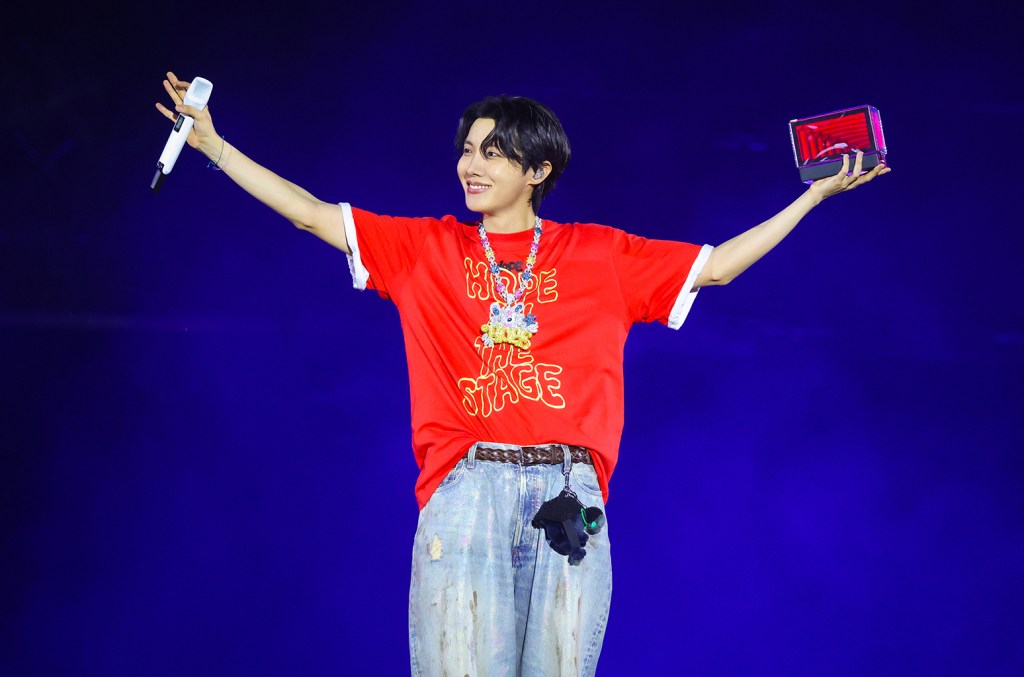
All seven members of BTS reunited in person at j-hope’s solo concert, marking the group’s long-awaited return as a complete unit.The emotional highlight of the evening came when Jin and Jung Kook surprised fans by joining j-hope onstage, creating unforgettable moments for those in attendance.
Held Friday (June 13) at the Goyang Sports Complex Main Stadium in Gyeonggi Province, South Korea, the final show of j-hope’s “HOPE ON THE STAGE” world tour encore coincided with the 12th anniversary of BTS’ debut — making the night even more meaningful for both the group and its global fandom, ARMY.
Jung Kook made a surprise appearance during j-hope’s solo track “i wonder…,” instantly sending the crowd into a frenzy. His unexpected entrance electrified the atmosphere, and fans responded with roaring cheers. “I really missed you,” he told the audience with a bright smile, before launching into a powerful performance of his solo hit “Seven,” drawing an explosive response.
Later in the show, Jin took the stage during the encore segment. After performing BTS’ beloved hit “Spring Day” alongside j-hope, Jin continued with a moving performance of his second solo EP’s title track, “Don’t Say You Love Me.” The emotional momentum continued as Jung Kook returned to the stage, joining Jin and j-hope for a special unit performance of “Jamais Vu,” closing the evening on a high note.
While Jin and Jung Kook took the stage, RM, Jimin, V and SUGA were spotted in the audience, watching the show and cheering their bandmate on. “I was singing while looking at my members,” j-hope told the crowd, expressing his deep affection for the group.
Jung Kook later added, “I was so nervous backstage. I’m here today because of my members. It felt overwhelming to stand in front of our fans again.”
This show also marked the first live performance of j-hope’s new post-military track “Killin’ It Girl” featuring GloRilla, signaling the start of a new chapter in his solo journey.
The stadium was filled with fans from both Korea and around the world, who came together to witness the long-awaited full group reunion. As all seven members reunited at j-hope’s concert, the moment served as a powerful reminder of BTS’ enduring unity and connection with their fans.
See photos of the night below:
The ongoing dispute between K-pop breakout group NewJeans and its agency ADOR, a HYBE subsidiary, escalated this week as the Seoul Central District Court approved a stricter legal measure restricting the group’s independent activities. In a ruling issued Friday (May 31), the court granted ADOR’s request for indirect compulsory enforcement, ordering each member of the group — Minji, Hanni, Danielle, Haerin and Hyein — to pay 1 […]
Best known as a dancer, rapper and singer-songwriter in BTS, j-hope has long stood out, with a magnetic stage presence and captivating dance moves that helped propel the group to global stardom. Now — as ARMY around the world anticipate the group’s remaining members completing South Korea’s mandatory military service and BTS reuniting in June, with group activities on hold until 2026 — the charismatic 31-year-old is distinguishing himself further, carving out a bold solo identity that showcases a versatility and creative range that extend far beyond his BTS persona.
Following his 2022 debut solo album, Jack in the Box, which peaked at No. 6 on the Billboard 200, and his 2024 Hope on the Street, Vol. 1 EP that rose to No. 5 on the chart, j-hope has already released collaborations this year with stars including Miguel, Don Toliver and Pharrell Williams. And with his Hope on the Stage World Tour, which kicked off Feb. 28 in Seoul, j-hope is reaching new heights: His show at Los Angeles’ BMO Stadium made him the first South Korean male solo artist to headline a U.S. stadium. (His bandmate Jin will hit the road this summer.) The tour — which will wrap June 1 after visiting 15 markets across North America and Asia, including a May 31 show in Osaka, Japan, that will be broadcast live to cinemas around the world — has mirrored his own artistic growth as he prepares for the next stage of his solo journey with his upcoming album. J-hope sat down with Billboard Korea in Los Angeles for an exclusive chat about his music, touring and inspirations.
Trending on Billboard
Louis Vuitton shirt, jacket, and pants; Audemars Piguet watch.
Julian Dakdouk
What does it mean to you to be on the cover of Billboard as a solo artist?
Growing up, Billboard seemed like a completely different universe to me. I’d follow the charts to see where my favorite artists landed, and that’s how I got a sense of the era’s musical flow and what sounds were defining each moment. So having my own music recognized by Billboard still feels surreal and exciting. To me, Billboard remains a dreamlike presence, and the amazing thing is, that dream is still unfolding, much like my song, “Sweet Dreams.”
You’re widely regarded as a symbol of hope — not only for your fans, but also for many Asian artists globally. How does it feel to have that kind of impact?
Just as I drew inspiration from the artists I admired growing up, shaping my own music through their influence, I’d be honored if my work could inspire others and pass on that same positive energy — that would mean the world to me. Above all, I hope to continue growing into an artist who brings light and encouragement to others wherever I go.
Louis Vuitton jacket and pants, Audemars Piguet watch.
Julian Dakdouk
Is there a particular message you want to convey with this tour?
Embracing my identity as j-hope, I found myself reflecting more deeply on the true essence of hope. I realized it’s not something to be taken lightly, so I wanted to channel that sincerity into my music and bring it to life through Hope on the Stage, sharing it with as many people as possible. I was hands-on with everything — stage design, choreography, fashion and even the props — pouring my heart into every aspect. I hope the audience left with a sense of genuine positivity and inspiration. Moving forward, I want to keep creating authentic performances that unite everyone through the power of music.
You made history in April as the first South Korean male solo artist to headline a U.S. stadium. How did that feel?
Having performed at countless stadiums with BTS, I was always part of a seven-member team filling the stage. This time, I was on my own, and honestly, I wondered if I could handle that immense energy and pressure by myself. But I pulled it off and that means a lot to me — it’s a milestone I’ll always cherish.
Louis Vuitton shirt, jacket, pants and shoes; Audemars Piguet watch.
Julian Dakdouk
You’re often hailed as a fashion icon. What ignited your love of style?
Ever since I was young, I’ve had a genuine passion for clothes. I don’t really see myself as a fashionista — I just have a deep, genuine love for fashion. To me, clothing is a powerful way to express my identity. Even during BTS world tours, I’d make time to visit local boutiques and explore different styles, which really helped shape my personal aesthetic over time. For my solo world tour, I handpicked every outfit for each performance, ensuring every look was distinct. I believe my approach to fashion adds a fun, dynamic element for fans to enjoy while watching my shows.
Your recent single, “Mona Lisa,” debuted at No. 65 on the Billboard Hot 100 and was released in March two weeks after your Miguel collaboration, “Sweet Dreams.” What’s the story behind these tracks?
I believe my music should evolve as I grow. Before my enlistment, I leaned into my roots in dance, experimenting with a variety of sounds to express different facets of myself. But just a week after my discharge, I headed straight to the U.S. because I wanted to explore how the American producers I admire would interpret my sound. “Sweet Dreams” featuring Miguel — an artist I’ve long respected — has a smooth, soulful vibe that feels deeply personal. On the other hand, “Mona Lisa” brings a hip-hop-driven performance energy. Both tracks are easy to connect with, yet they offer a glimpse into the broader, more evolved musical world I’m building. This is just the start — I have plenty more musical experiments in store.
This story appears in the May 17, 2025, issue of Billboard.
Best known as a dancer, rapper and singer-songwriter in BTS, j-hope has long stood out, with a magnetic stage presence and captivating dance moves that helped propel the group to global stardom. Now — as ARMY around the world anticipate the group’s remaining members completing South Korea’s mandatory military service and BTS reuniting in June, […]
As Korea’s most popular virtual idol group, PLAVE is sometimes misunderstood as an AI-generated illusion. But the artists behind the animated band members are real, as are the videographers, engineers, graphic designers, animators and retouchers who bring their imagery to life.For the latest edition of Billboard Artist, Billboard Korea spoke to the characters who power PLAVE. Here are highlights from the conversation.
This edition is built around five key elements—earth, fire, water, air and a fifth: the “digital universe,” which represents PLAVE’s origin story. If you had to define one final element that completes the world, what would it be?
Yejun: For me, it’s truth—and being real, always. When you put your real feelings out there, people can feel that. Doesn’t matter where you are or who’s watching—genuine energy just hits different.
Noah: Happiness, 100%. I feel like almost everything we do in life—whether it’s grabbing food, texting a friend, even just taking a nap—is basically us chasing happiness in some form. That’s honestly why I do PLAVE, too. It makes me happy, and I get to run after this wild, exciting dream with the members.
Bamby: Emotion—for real, it’s everything. Like, I don’t think we even start doing anything without some kind of feeling behind it. Even when I’m like, “Okay, time to sing,” there’s always a reason—someone I’m thinking of, some mood I’m in. It’s all driven by emotion. No spark, no move. That’s just how I run.
Eunho: Analog. If PLAVE started in a digital universe, I think the heart of our story still has to feel human. The more high-tech the world gets, the more I feel like people crave something soft, something real. There’s this quiet nostalgia for the imperfect stuff—the human side of things. Maybe that’s why what we do connects. It’s not just the tech. It’s the feeling behind it. So yeah, if I had to name the final element, I’d call it analog warmth.
Hamin: Faith. I feel like everything starts from that. It’s because we believed that PLAVE could exist, and it’s that same belief that lets us love each other—and be loved back.
Like the idea of a flower pushing through tough soil, what’s something meaningful you’ve grown from a hard time?
Bamby: I’m really into growing plants. There’s just something magical about watching life sprout from plain old dirt—seeing it grow, bear fruit, and then return to the soil. That whole cycle is so beautiful to me. It made me realize nature is all about giving and receiving, in this constant loop. And I’m part of that too, right? I think I’m growing a little every day—like a tree, like a flower. I don’t think we’re meant to bloom just one flower or grow one fruit in our whole life. It’s more like—we keep blooming whatever fits that moment. One season, one vibe, one version of ourselves at a time. Performing as PLAVE? That’s one of my flowers. Doing this interview? Another one. It’s not about having a single perfect blossom—it’s about living in a way where you’re always trying to bloom something real. That’s the part I care about most.
Water seems soft, but it’s one of the strongest forces in nature. It cuts through diamonds with speed, shapes stone with patience, and sometimes, all it takes is one tear to move a heart. What’s a quiet strength you carry that people might not see at first—but feel over time?
Yejun: I think I’m like the ocean—quiet, steady, but ready to hold whatever comes my way. I want to be that kind of space for the members, and for PLLIs too. Like a winter sea—calm and still, the kind you can sit beside when you just need to breathe. And like a summer sea—cool, open, and full of light when you’re in a good place. That’s the kind of strength I believe in. Not loud, not flashy—just… always there. If I can be someone you lean on without saying a word, someone who gives you peace just by being around—that, to me, is real power.
Silver hair, red eyes and fire all feel timeless—almost immortal. But they also carry a certain quiet, a sense of solitude, like midnight. Do you see yourself as someone who stands apart? And when you feel that distance, do you lean into it—or try to break through it?
Eunho: I think I do find comfort in solitude. When I’m alone, I get to slow down and think—about where I’m going, how I want to grow. If I’m in a good mood, I’ll quietly celebrate by myself. And if I’m not, I’ll sit with that too, try to unpack it. But I’ve also learned that staying in that space too long isn’t always healthy. It’s easy to sink into it without noticing. That’s why I try to face those feelings—and then step out of them. I think that’s where growth really happens. So yeah, I like being alone. But I never want to get stuck there.
In ancient alchemy, gold wasn’t just treasure—it was the fifth element, the last piece of a perfect world. These days, it’s still the ultimate symbol of excellence. So tell us: are you quietly working your way toward being PLAVE’s golden member? (And no, we’re not just talking about the hair, lol.)
Noah: Wait—are you calling me the golden member? That’s wild. Thank you, seriously. Honestly, I think all of us in PLAVE are kind of wired to chase perfection in our own way. But yeah, since I’m one of the older ones along with Yejun, I do feel that extra layer of responsibility. I’m always thinking like, “How can we level up as a team?” “What’s the next version of PLAVE the world hasn’t seen yet?” If we were a car, I’d probably be the one with both hands on the wheel, eyes on the road. Just trying to steer us forward—safe, strong, and headed somewhere amazing.
In today’s digital world, there’s a growing craving for something real—for that human touch. More and more people feel the need to know what’s real. How do you handle that kind of pressure, and how do you stay grounded in your own truth?
Hamin: Honestly, I don’t really see the point in drawing a hard line between what’s “real” and what’s “virtual.” I think everyone’s just living in the version of reality that feels real to them. And for me? Virtual is real. People are free to see it however they want—I don’t feel the need to push back or prove anything. What actually matters is: can we still connect? Can we understand each other, share something real, even in a digital space? That’s the kind of reality I believe in.
The theme of this edition, QUINTESSENCE, is all about the five elements coming together to represent purity, essence, and ultimate quality. If you had to define the “essence” of each of your fellow members in one word or phrase, what would it be?
Yejun:
Hamin – Maturity. He may be the youngest, but he’s often the most grown-up of us all.
Eunho – Purity. When he’s working on music, you can feel how purely he loves what he does.
Bamby – Nature. He’s probably the most effortlessly natural person I’ve ever met.
Noah – Charm. There’s just something about him—you can’t dislike him. It’s a superpower.
Noah:
Yejun – The blueprint. Total husband material. No notes.
Bamby – Wild card. He’s our 4D king—you never know what’s coming next.
Eunho – Puppy. It just fits, okay?
Hamin – Black cat. And yep, I mean that exactly how it sounds.
Bamby:
Yejun – Soft blue. He’s solid as a leader and sees every little detail in the team.
Noah – Honesty. He’s always showing his true self, to everyone.
Eunho – Fiery red. He brings that bold, energetic passion to PLAVE.
Hamin – Leafy green. Like a strong tree, he quietly keeps the team balanced.
Eunho:
Yejun – The Center. To me, Yejun hyung is the gravitational core of PLAVE. He holds us all together, not just as a leader but as a person. What makes him special is the way he balances warmth with sharp clarity. I’d say he’s 60% cool-headed, 40% soft-hearted.
Noah – The Seasoning. He’s like that one pinch of spice that takes everything from “okay” to “oh dang.” His voice? Total flavor boost. We’ll be working on a track, and the second he hops in—boom, it all makes sense. And on air? He’s the one dropping those chaotic one-liners that make us lose it. What gets me is how he flips between genius-level precision and total goofball energy. You never really know which version you’re getting—and that’s exactly what makes him fun.
Bamby – The Sour Peach. Bamby’s like a tangy peach—sweet, zingy, full of character, and always keeping you guessing. I’ve known him for a while now, and just when I think I’ve got him figured out, he shows me a new side. He lives like he’s the main character in a movie. “Sour peach” might sound funny, but it fits him perfectly.
Hamin – The Bassline. And I mean that literally and emotionally. He plays bass, sure—but more than that, he is the base of PLAVE. He holds us together, gives the group shape. He’s the youngest, but he’s the one checking in on everyone, keeping the vibe grounded whether we’re on or off stage. Quiet, steady, solid—that’s Hamin.
Hamin:
Yejun – Selflessness. He leads by example and always puts others first.
Noah – Sensitivity & humanity. He’s observant, thoughtful, and always there with the right words.
Bamby – Approachability. He vibes with everyone and makes people feel seen. He knows when to lean in and when to lean on.
Eunho – Warmth & light. He lifts me up with compliments and always knows how to make me laugh.
Image Credit: Billboard Korea + VLAST
Yejun: I think I’m like the ocean—quiet, steady, but ready to hold whatever comes my way. If I can be someone you lean on without saying a word, someone who gives you peace just by being around—that, to me, is real power.
Image Credit: Billboard Korea + VLAST
Noah: Since I’m one of the older ones along with Yejun, I feel that extra layer of responsibility. I’m always thinking like, “How can we level up as a team? What’s the next version of PLAVE the world hasn’t seen yet?” If we were a car, I’d probably be the one with both hands on the wheel, eyes on the road. Just trying to steer us forward—safe, strong, and headed somewhere amazing.
Image Credit: Billboard Korea + VLAST
Bamby: I’m really into growing plants. There’s just something magical about watching life sprout from plain old dirt—seeing it grow, bear fruit, and then return to the soil. That whole cycle is so beautiful to me. It made me realize nature is all about giving and receiving, in this constant loop. And I’m part of that too, right? I think I’m growing a little every day—like a tree, like a flower. I don’t think we’re meant to bloom just one flower or grow one fruit in our whole life. It’s more like—we keep blooming whatever fits that moment.
Image Credit: Billboard Korea + VLAST
Hamin: Honestly, I don’t really see the point in drawing a hard line between what’s “real” and what’s “virtual.” I think everyone’s just living in the version of reality that feels real to them. And for me? Virtual is real. People are free to see it however they want—I don’t feel the need to push back or prove anything. What actually matters is: can we still connect? Can we understand each other, share something real, even in a digital space? That’s the kind of reality I believe in.
Image Credit: Billboard Korea + VLAST
Eunho: I think I do find comfort in solitude. When I’m alone, I get to slow down and think—about where I’m going, how I want to grow. If I’m in a good mood, I’ll quietly celebrate by myself. And if I’m not, I’ll sit with that too, try to unpack it. But I’ve also learned that staying in that space too long isn’t always healthy. It’s easy to sink into it without noticing. That’s why I try to face those feelings—and then step out of them. I think that’s where growth really happens. So yeah, I like being alone. But I never want to get stuck there.
Image Credit: Billboard Korea + VLAST
From left: Eunho, Yejun, Noah, Bamby and Hamin of PLAVE.

 State Champ Radio
State Champ Radio 